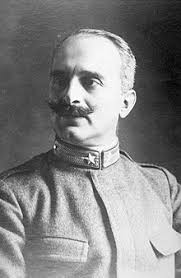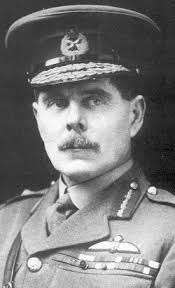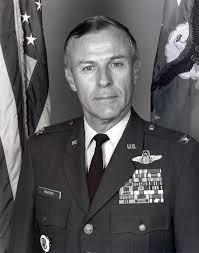
Giulio Doheut. Giulio Doheut was born into a military family in Italy in 1869. He served as a professional artillery officer and was never trained as a pilot but he was an innovator and had the quality of stirring things up. He was appointed commander of Italy’s first aviation battalion before World War I. During the War, his indiscreet criticism of his military and civilian superiors resulted in him being court-martialled and imprisoned for one year. However, the war (Battle of Caporetto) demonstrated that he was correct and was later exonerated. Soon after the war, Douhet was given a place of honour, but he left the service and passed his remaining years writing and speaking about airpower. He brought forth his Command of the Air in 1921 as an official publication. Douhet died in 1930.
Core Ideas and Beliefs. Douhet argued that an early air attack on the enemy’s vital centres could win a humane victory, while surface forces could contain the enemy. In his opinion, the air attacks would hasten the termination of war and the overall death and destruction would be lesser. Douhet assumed that all wars will be total wars, civilian morale is unstable, airpower is inherently offensive, the bomber will always get through, and the hegemony of the defensive form of ground warfare is permanent.

Hugh Trenchard. Hugh Trenchard, a British theorist was born in 1873. He learned to fly in 1913 and fought much of World War I as head of the Royal Flying Corps in France. Initially, he was opposed to the idea of the creation of an independent air force and strategic bombing. On his return to the United Kingdom in 1918, he was appointed chief of the air staff of the Royal Air Force (RAF). He remained in his post through the first decade of the RAF’s existence and was beleaguered by both the army and navy because they were generally determined to undo the creation of the RAF. He soon became an advocate of strategic bombing and colonial control through the use of airpower. He lived on for a long time after retiring in 1929 and died in 1956.
Core Ideas and Beliefs. Trenchard’s core idea was that victory could be achieved by bombing enemy vital centres and thus breaking his will. He was a little vague on what those centres were, but he seemed to suggest that civilian morale could be undermined by attacking vital industrial and communications targets. He also believed that the RAF could do more to maintain order in colonial areas much more cheaply than the other services. He assumed that the offensive is the stronger form of air war, air superiority is a prerequisite for all other military operations, civilian morale is fragile (the moral effect of bombing is much more devastating than the physical effect), the bomber will always get through and it does not need escort, and the air war aspects like night navigation, target acquisition, and bombing accuracy are manageable problems.

William Mitchell. William Mitchell was born in France in 1879 and spent the first three years there. He came from a wealthy and prominent Wisconsin family (His father, was a US senator of the Democratic Party). He attended a private school and was enrolled in the ancestor unit of George Washington University for three years, but did not graduate. He left school when the Spanish-American War broke out. He remained in the Signal Corps, serving in Cuba, Philippines and Alaska. Mitchell was appointed to the General Staff at a young age, while still a captain, and was the only Signal Corps officer so assigned. Mitchell occasionally wrote on aviation subjects but displayed no particular interest in flying then. He completed his flight training near Norfolk in 1916, just before the United States entered World War I. He commanded combat aviation at the front and returned home after the war to become assistant chief of the Air Service. Mitchell wrote several books, some of which were published before he resigned. He deliberately provoked a court-martial in 1925, was convicted of insubordination, and left the Army early in 1926. He lived on his farm in Virginia for the rest of his life and died in February 1936.
Core Ideas and Beliefs. William Mitchell propagated that Airpower, organised into a separate, equal (to Army and Navy), and autonomous air force under a unified Department of Defence, could serve as the most effective and economical means of defending the homeland. Even for fighting an overseas enemy, airpower could be used to decisively attack the enemy’s vital centres without first defeating his armies and navies. Mitchell assumed that future wars would be total, airpower is inherently offensive and its use is revolutionary, civilian morale is fragile command of the air is a prime requirement, the bomber will always get through, and airmen alone can understand the proper employment of airpower.

John Warden. John Warden was born in Texas in 1943. He earned a master’s degree in political science from Texas Tech University was appointed to the Air Force Academy from Pennsylvania and graduated in the class of 1965. He conducted a combat tour in OV-10s with the First Air Cavalry Division in Vietnam, and a tour in F-4Ds. While at the National War College, Warden wrote a thesis on air operations planning at the theatre level of war. After that, he was assigned as F-15 wing commander at Bitburg, Germany. He remained in that grade when he returned to the Pentagon to head CHECKMATE, an office serving under the Air Force deputy chief of staff for plans and operations and concerned with long-range planning. Warden was serving in that capacity at the onset of the Gulf War. After the Gulf War, Colonel Warden was transferred to Maxwell Air Force Base, where he became commandant of the Air Command and Staff College (ACSC). He stirred up that institution greatly, reorienting its study to focus on the operational strategy level of war and air planning at that level. Warden retired from the USAF in 1995. Warden wrote the book “The Air Campaign: Planning for Combat”, which focused on a European war. He seemed to be much more concerned with airpower than with flying aeroplanes.
Core Ideas and Beliefs. The core ideas of John Warden are that the art of air campaign planning is vital and that once air superiority is assured, airpower can be used either in support of the other arms, or can be supported by the other arms, and sometimes can function independently to achieve decisive effects. The technology also has made parallel attack (as opposed to sequential ones) more possible than ever, and that is highly desirable. The centers of gravity vary from case to case. They may be arranged in five rings. At the center are leadership targets, then means of production, infrastructure, population, and fielded forces in the outer perimeter. Almost all states and other political entities have the five rings, and they always appear with leadership at the center. In general, it is preferable to attack the rings from the center, then move outwards.
Coming up:- Detailed article on relevance of their theories today.
Suggestions and value additions are most welcome
For regular updates, please register here:-
References and credits
To all the online sites and channels.
Disclaimer:
Information and data included in the blog are for educational & non-commercial purposes only and have been carefully adapted, excerpted, or edited from sources deemed reliable and accurate. All copyrighted material belongs to respective owners and is provided only for purposes of wider dissemination.
